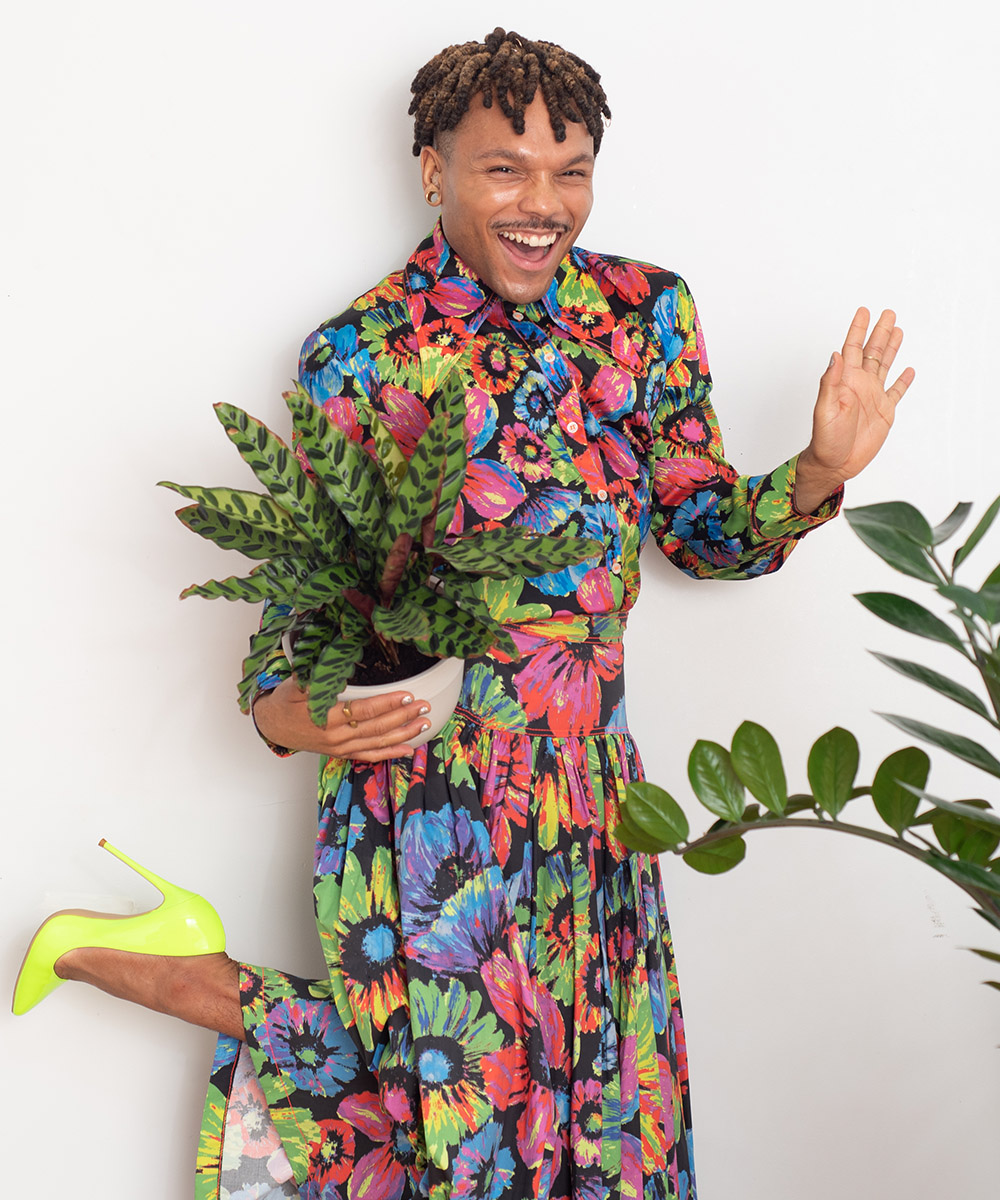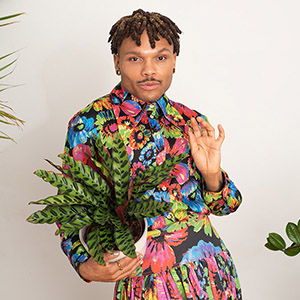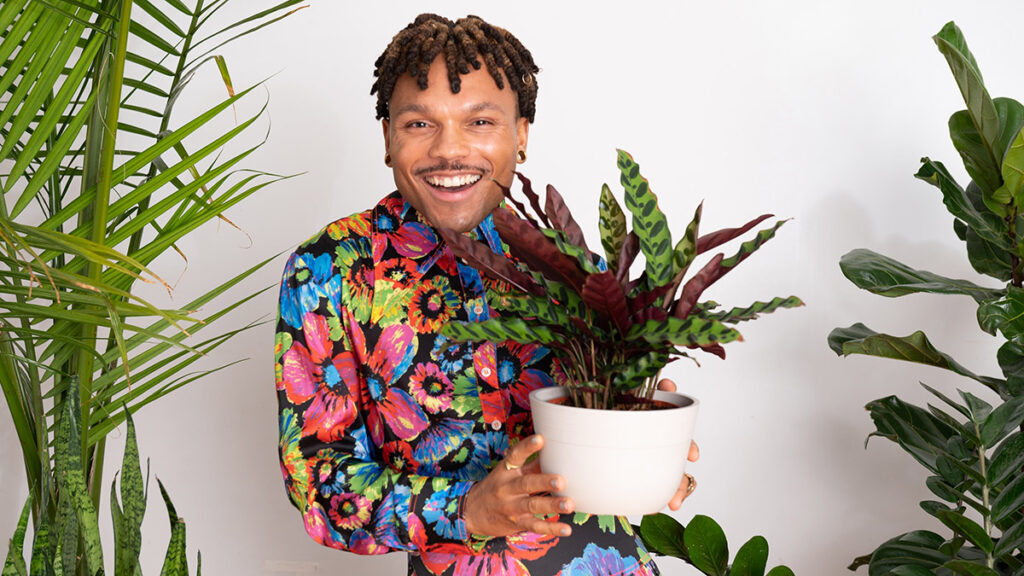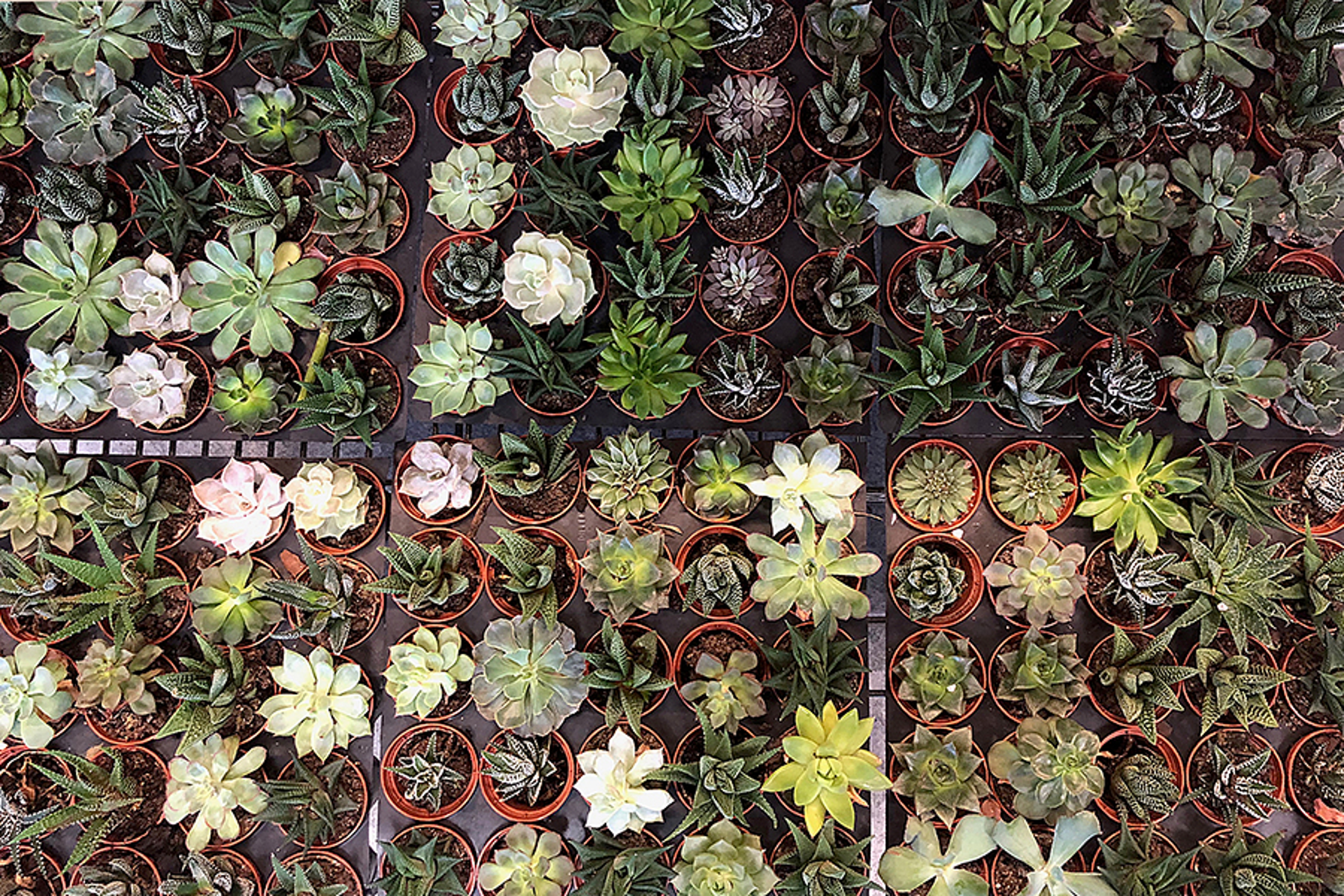Meet Plant Kween, the Brooklyn-based Gardener Who’s Changing the Plant Parenting Game
The self-described "over-nurturer" shares how taking care of plants can fit into your overall wellness routine.
Feb 22, 2023

Growing up in Philadelphia, Christopher Griffin (they/them) learned about the power and beauty of nature from their great-grandmother, grandmother, and mother — all of whom passed their love of horticulture on to them. Today, Griffin, aka Plant Kween, has more than 370K followers on Instagram, where they post updates about plant tours, shopping excursions, and tips on garden care and cultivation. The account is a window into the life of Plant Kween, who uses nature enthusiastically and daily to learn about and nurture themselves, and ultimately grow.
We caught up with Griffin to learn about their sprawling plant collection, why it's important for queer and trans people of color to connect with nature, and tips on waking up the plant parent in all of us.
Why is nature essential to human well-being?
From the air we breathe to the food we eat, we would not be here without plants. It's important people understand that. Also, with the way technology has uprooted us — all puns intended — it has taken us away from the basic simple beauties that nature puts before us. Bringing nature into your home is a lovely way to reconnect with that simple beauty.
How should we care for nature inside our homes and workspaces?
Do the proper research and look up the natural habitats of the plants you bring home. Are they used to growing on trees or in the shade? Try to mimic that scene for the plant, such as humidity and sunlight. Also, make sure the plant has proper room to spread its roots. They need room. And practice patience, trust in yourself, and in the plant as well.
Have you ever had a hard time with a particular plant?
I went through many fiddle-leaf figs (ficus lyrata); she's known to be a very moody queen in the plant world, but I don't consider her moody. She's a queen that knows what she likes, and if you're not going to give it to her, she'll drop her leaves. I struggled with that plant; I kept moving her around, and she didn't like it. She couldn't establish herself. Many of mine are in the little botanical garden in the sky.
What are some tips for becoming a great plant parent?
Have a sense of curiosity. You're caring for something living and breathing that has a history. Be curious; learn about that plant, but also learn about yourself.
For me, I over water — that's how I kill most of my plants. I realized I'm an over-nurturer; I learned too much of a good thing can be a bad thing, so I had to adjust.
You've killed plants? Don't you have a green thumb?
I don't believe in the green thumb myth — it's an anxiety-provoking phrase. People feel you must have these "skills" to take care of plants. That's not true. You just have to allow yourself to learn.

What advice do you have for someone who is feeling stressed about caring for a particular plant?
It's a natural feeling to have; some plants are just difficult to care for.
I would encourage them to reassess. Maybe that plant is just not the plant for your space, or maybe it was not going to survive no matter what you did. I have over 225 plants, but I'm not going to even count how many plants I've had that trial-and-error moment with.
If a plant is stressing you out, give it away. Give it to a person who is equipped with better space or more time. I've given tons of plants away. I check on them, and they're all doing great.
Research shows that talking to your plants helps them grow. Do you talk to your plants. If so, what kinds of conversations do you have with them?
Yes, I do talk to my plants sometimes, but it's more for me than for my plants, like a motivational talk. "You are growing, girls!" It's a reminder that I can keep growing, too; I'm like a medium having a conversation with myself.
They say the same thing about playing music for your plants. Research suggests there are soundwaves that impact the cellular interaction of the plants, which may help them grow. The more probable thing is a person speaking or playing music is providing top-level care for their plants.
Do your plants talk back? Or communicate with you?
All the time. [People] are basically houseplants with complex emotions, so a lot of things plants go through, we go through, too. Sometimes our plants get stagnant, and they stop growing — same with us. We all need room to grow. Sometimes plants need to let go of yellowing leaves and concentrate their energy elsewhere, like us. My plants speak to me, and it's important for me to listen.
What do your plants say to you?
They tell me when they need water — that's when they wilt. Certain plants are literally screaming at me: "Girl, I need a drink!" I investigate what are the better ways I can care for this plant, and then I do it.
How is your love for plants related to fashion or your lifestyle?
I am a person who is really inspired by the different leaf shapes of particular plants, so sometimes I use that for fashion inspiration, like a silhouette I want to wear. But on a deeper level, when you're caring for plants in your home, there's an appreciation for what the earth is providing. I've changed some of my own behaviors around sustainability and how I can be better for the planet, because I understand how fragile nature can be.

How are plants part of a wellness routine?
Studies show plants reduce our level of anxiety and stress. I have been navigating anxiety for most of my life, and plants have provided me with an opportunity to just sit still. Gardening is my meditation, so every day I interact with my plants in a very intentional way.
I'm a routine queen. I love my routine; it helps me feel grounded. Plants remind us of the different ways we need to care for ourselves. We need room to grow, water, sunlight, air — I incorporate those elements into my every day.
How are you and plants creating conversation in the QTPOC (queer and trans people of color) space?
As a Black person, and understanding some of the historical trauma that Black folks have experienced with nature, in times of slavery, it's a reclaiming and reimagining of what that interaction can look like for me. And as a queer, non-binary person who is constantly reimagining and redefining my place in this world, my plants give me space for rest, rejuvenation, and relaxation. Plus, there's the need for Black, queer, non-binary joy, and plants are my way to experience joy.
With regard to representation, I remember when I started the PlantKween Instagram account, I didn't put myself in the picture. Then I started looking around the digital community and realized there can always be more Black, queer, non-binary, and trans folks engaging with horticulture. We deserve representation and visibility in these spaces.
What are some of your favorite plants?
I love succulents, mainly because there are so many different varieties in all parts of the world, which speaks to their resiliency. Another fave is, obviously, the pothos, and, in particular, the variegated version, marble queen pothos, my very first plant. And monstera deliciosa, aka the Swiss cheese plant. I have a 30-year-old one near and dear to my heart, and it has been growing wonderfully.
What are some care tips for the 2023 Plant of the Year, the calathea rattlesnake?
Calatheas are known to be queens that will brown very easily on the tips. So, my number one tip for taking care of them is to make sure they are in a humid place. Calathea are understory plants (plants that grow naturally in low-light conditions); they're used to those humid, shaded environments. A bathroom, or any room with a humidifier, is a wonderful place for that plant. Be mindful of how you water it, too, as it may need more water than other plants.
You live in Brooklyn, where space is often limited. Do you have any advice on how plant lovers can turn their small spaces into their own personal oasis?
Get creative. I encourage folks to take time with their space. When I moved into mine, I ordered pizza and sat on the floor and mapped out the space, just watched the sun move through the space. It was so peaceful, calm, and meditative.
Get to know your space. Where are the heaters? The AC? The cold drafts? The warm drafts? Is there central air? For smaller spaces, go vertical. I put up all this shelving in my space and applied grow lights where I didn't have a lot of lighting. I put plants on a utility cart. Get creative, have fun, and don't stress out. That's how to reinvigorate the plant parent within you.







